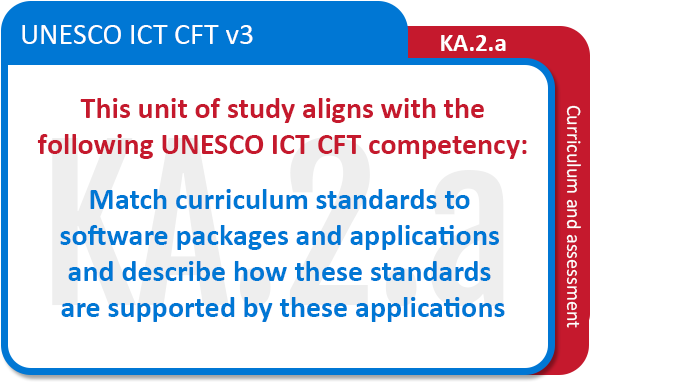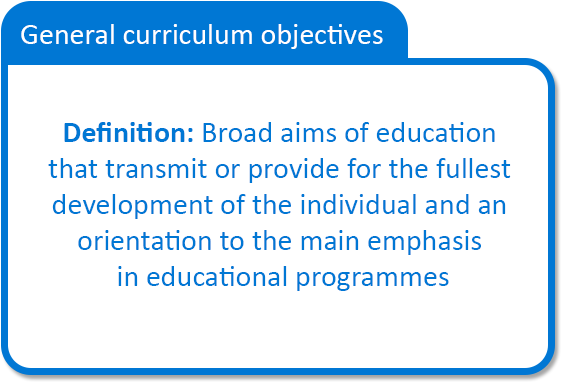Topic outline
- General
- Welcome and introduction


How do you know what to teach? Silly question? The official curriculum documents of course! In every country educators refer to these guiding documents to shape and influence what, and how, they teach. While terminology may differ from country to country, for example objectives vs standards, all educators are grateful for the clear directives the curriculum provides.
In recent times, however, many curriculum developers have foreseen that in order to prepare our students for the world outside the classroom, they need to be exposed to additional skills relevant to our times. Curriculum documents now identify skills and knowledge sets that are in addition to the specific confines of particular subjects or learning areas. One of these skills is ICT literacy but there are numerous others too. It's time to take a deeper look at how ICT can support the curriculum and the delivery of skills necessary to function in the 21st century.

On completion of this unit participants will be able to:
- Investigate and source digital versions of curriculum documents from the national education authority's website
- Determine what role for ICT has been envisaged by the national education authority as expressed within the official curriculum
- Identify sixteen 21st century skills as defined by the World Economic Forum
- Integrate at least two 21st century skills into their teaching and learning.

- ICT in the official curriculum

Where do you look for ICT in Education curriculum support? Many national education authorities have identified the use of ICT as a critical cross-cutting requirement in all grades and subjects. Some countries have even incorporated suggestions about how ICT should be integrated into subject syllabi. In those countries for example, the Physical Science syllabus has suggestions about how ICT can be used to acquire the subject's specific objectives. Sometimes advise about how ICT might be used is written into teacher subject guides and is taught at teacher training colleges. Your first stop is to identify if such support has been incorporated into your country's curriculum statements.
Activity 1
- Using the internet browser access the national education authority's website
- Identify and access the section of the site where they have organized digital versions of the curriculum. The actual steps to do this will be different from country to country, so we can't give you explicit instructions here. However, this exercise is important as you need to be familiar with where these critical documents are hosted. You will need to visit the site from time to time to access the latest versions, so persevere!
- Within the learning area/topic/grade you teach, access the appropriate curriculum documents. Note, in some countries they refer to these guiding documents as subject syllabi, whilst others mention them as curriculum standards.
- Now investigate in what ways your local authority has made reference to ICT use within these official documents. This will vary from country to country. Some have created a special section dedicated to cross cutting themes, general objectives and/or a section specifically on ICT integration. Others have incorporated ICT integration suggestions directly into the content/specific objectives section, even providing some teaching suggestions. See if you can identify what your education authority has said formally about the integration of ICT into teaching and learning.
Create a post in the forum below. Based on your Internet research of your national education authority's website and documentation, do you feel that there is sufficient guidance on:
Activity 2- What role ICT is supposed to play within your learning area/subject/grade?
- Specific advice on how to integrate ICT into your learning area/subject/grade?
See what others have posted and reply to at least two posts.
Below is an example of a teacher guide that encourages the use of ICT as a component of the teaching and learning. This example comes from South Africa.

Use this link below to see the entire document.
- General curriculum objectives / standards

Did you identify your national curriculum documents in the activity above? A perusal of most curricula documents will identify specific objectives or standards, i.e. specific subject knowledge and/or desired behaviors to be attained while studying the subject, but also general objectives or standards. Note the definition below to differentiate between the 'specific' and 'general'.

General objectives can often include knowledge and skills that are pervasive and cut across all content areas within the subject curriculum. The ability to use ICT proficiently is often considered a general objective in many subject curricula. Another set of general objectives often identified within curricula are 21st century skills. Watch the video below, created by the World Economic Forum, that explains why governments across the world are advocating that educators inculcate 21st Century Skills into teaching and learning.
- 21st century skills

Just what are these 21st Century Skills? According to the Glossary of Education Reform website: "The term 21st century skills refers to a broad set of knowledge, skills, work habits, and character traits that are believed—by educators, school reformers, college professors, employers, and others—to be critically important to success in today’s world, particularly in collegiate programs and contemporary careers and workplaces." Below is a list of the 16 skills organized by foundational literacies, competencies and character traits:

So what does each of the 16 skills actually mean? Select the link below for definitions of each as described by the World Economic Forum.
That's quite a list! Now you can see why curriculum documents often champion general objectives as being just as important as specific objectives. While 'ICT literacy' is specifically identified as a 'foundational literacy' in the diagram above, if implemented well, ICT can be used to support the acquisition of the other fifteen 21st Century Skills.
Australia's Queensland Curriculum and Assessment Authority (QCAA) has embraced the use of 21st Century Skills in their curriculum documents. Watch the video below to see their justification for doing so.
- Assignment

To what extent do your current curriculum standards advocate the use of 21st century skills? Do you have any ideas what you could do now in your teaching that would embrace both a role for technology and incorporate some of the other 21st century skills?- Using any app or software, write a lesson plan that shows how you would incorporate technology and ideally another 21st century skill into your teaching
- Ensure that you make specific reference to official curriculum documents and explicitly link your lesson to a curriculum objective or standard
- Use the assignment submission tool below to upload your digital document
- Before you begin, have a look at the assessment criteria to appreciate how your submission will be marked.
- Conclusion, attribution & licence


The following are the main messages of this unit of study:
- ICT can play an important role in helping you access digital versions of the official curriculum, standards and/or syllabus documents
- In many countries, ICT competencies/standards have been integrated into different subject syllabi
- Many curriculum documents call for educators to implement general objectives. These are usually cross-cutting or thematic skills or knowledge over and above the specific objectives aligned to subject content and skills
- Many curricula now call on educators to implement 21st Century skills as part of the curriculum. 21st Century skills are 16 foundational literacies, competencies and character traits considered necessary to ensure learners enter the world of work with a skill set that is valued by the labour market.
The following open resources were adapted to create this unit of study:
- Glossary of Education Reform. (2016). 21st Century Skills. Available online here. (CC BY-NC-SA).
- Siyavula. (nd). Natural Sciences and Technology Grade 6: Teachers Guide. Available online here. (CC BY-ND).
- World Economic Forum. (2016). Employment, Skills and Education. Available on YouTube. (CC BY).
- QCAA. (2017). Introduction to the 21st century skills. Available on YouTube. (CC BY).

The following resource influenced the development of this unit of study:
- New Economic Forum. (2015). New Vision for Education - Unlocking the potential of technology. Available online here. (Full copyright).


ICT Essentials for Teachers by UNESCO is licensed under a Creative Commons Attribution-ShareAlike 4.0 International License.
All content not licensed under a Creative Commons licence is all rights reserved, and you must request permission from the copyright owner to use this material.
1
2
3
4
5
6